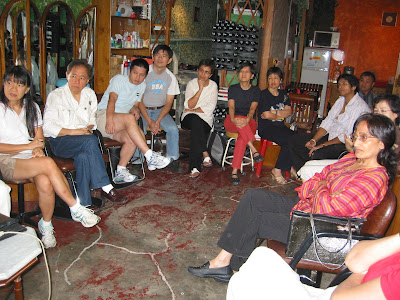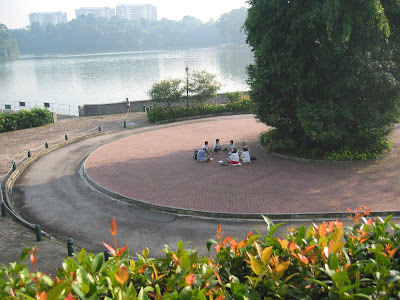.
Search Results
Wednesday, August 27, 2008
Lost In Conceptualisation
.
Friday, August 22, 2008
Cat's Play
 My cat likes to bring back dead mice into the house, meant as presents for me. It is his own way of saying "thank you" to me. However, I don't really want these dead creatures like, mice, frogs, birds, dragon flies...etc, in the house as I will have to clean up and throw them out again. It is work for me. Also these creatures, including the mice, are from the woods and are not house pests, they had been minding their own business until they were caught by my cat.
My cat likes to bring back dead mice into the house, meant as presents for me. It is his own way of saying "thank you" to me. However, I don't really want these dead creatures like, mice, frogs, birds, dragon flies...etc, in the house as I will have to clean up and throw them out again. It is work for me. Also these creatures, including the mice, are from the woods and are not house pests, they had been minding their own business until they were caught by my cat. Monday, August 18, 2008
Daily Contemplation
.
Friday, August 15, 2008
Kids Play 14 - Golden Spirituality
 The family was watching a documentary on Venice that explained the art of Italian mosaic and its adding of real gold to symbolise the spirituality of Jesus, Mother Mary and the various saints.
The family was watching a documentary on Venice that explained the art of Italian mosaic and its adding of real gold to symbolise the spirituality of Jesus, Mother Mary and the various saints. 
.
Wednesday, August 13, 2008
Gross National Happinesss 2
Dear Sir,
.
.
.
.
.
Man is a total energy system, not just comprising cells, fluids and bones. Within us, too, is an energy system of thoughts, feelings and emotions. Love, which vibrates at the highest level, is capable of converting lower energies and possibly impacting everyone, whether close by or far away.
.
.
.
.
.
.
Clinton Lim
Tuesday, August 12, 2008
Gross National Happinesss
Some of you may have heard of Bhutan's Gross National Happiness index. I have not been to Bhutan, but found some informative videos on Youtube, which I have included here, as they have helped me to reflect on my life and the priorities I set for myself daily.
Some data about Bhutan (from Wikipedia):
Location: In the Himalayas, in between China and India.
Capital: Thimpu
Land area: 47,000 sq km
Population: 672,425
Per capita GDP: $5,477
For more on the history and geography of Bhutan, click here
Here is an introductory video of Bhutan:
.
.
Click here to watch this video entitled, "Dragon Kingdom Bhutan". It depicts the country, its culture rooted in Buddhism and their reverence to their King, who embraces happiness above their GNP.
Early this year, Bhutan became a constitutional monarchy, with their first democratic elections:
.
.
.
.
As Bhutan opens up, some of the social ills found in the West have started to surface in the country. The following documentary depicts the situation, where alcoholism and drug abuse has become an increasing problem.
.
Questions:
1. Do you think Gross National Happiness can be applied to the country you live in? Does it apply to a densely populated city-state like Singapore that relies heavily on industrial efficiency, foreign labour, foreign trade and tourism?
2. Do you think Happiness should be the ultimate end of companies and organisations in their quest for material wealth? Watch the commuters in mass rapid transit in the morning rush hour. I have tried observing this in London, Paris, Brussels, Amsterdam, Budapest, Singapore and Hong Kong. They always give me a quick and rough guide to a city. Is GNH feasible amid the vagaries and the harsh cut-and-thrust forces of the market economy? Is there a better economic model? Communism failed. Socialism is expensive! :) How about Bucky's vision of the 'World Game'? Read here . Or Alvin Toffler's Revolutionary Wealth? Read here
3. Do you think as an individual, you can put happiness first? Is this feasible with the meritocratic and competitive school system you go to, or the organisation you serve?
4. As a parent, do you tell your child to study hard to make more money and have a comfortable life after that? Or do you remind your children to be educated so that they will grow up to be useful citizens that can put a smile on every other person he meets everyday?
5. In the quest for happiness, does it necessarily mean that you will have less material wealth? Do you think it is worthwhile to sacrifice material for happiness? Or does sacrificing happiness for material wealth makes more sense to you?
6. Many of us have been happy children when we were little, yet we didn't realise we were poor at the time, until years later as an adult. Why is this so?
.
Monday, August 11, 2008
...till death do us part - Part 2
 I have not heard about her since I visited her place some twenty years ago in her village. My friend knows her son. Then, she seemed a happy woman and her husband at that time was a teacher in the local school.
I have not heard about her since I visited her place some twenty years ago in her village. My friend knows her son. Then, she seemed a happy woman and her husband at that time was a teacher in the local school.Saturday, August 02, 2008
Bucky Group 31 - Leonardo Da Vinci
 .
.This is part 2 of the Leonardo Da Vinci documentary screened during the Bucky Group today.
.
.
.
.
.
.
.
(This discussion notes are emailed to me by WhatIDiscover. I was only there in spirit.)
Discussion:
.
They are curious people who have deep expertise in one subject matter (the vertical leg of the T) and broad interest in one or many other subject matters (the horizontal part of the T). For example, Joo Hock is an expert in hairdressing and he also have broader interests in training, community management, events management, singing…etc.
The T Talents idea is a shortened version of the T-shaped people idea. It is like using TinyURL.com to shorten a long web address to a short one. T-shaped people are people who are so inquisitive about the World that they are willing to try to do what you do. They have a principle skill that describes the vertical leg of the T – they might be mechanical engineers or industrial designers. But they are so empathetic that they can branch out into others skills, such as anthropology and do them as well. They are able to explore insights from many different perspectives and recognize patterns of behaviour that point to a universal human need.
Source:
I share the same view that we need T Talents in the future with Steve Mills of IBM.
The following paragraphs are taken from his thought leadership paper.
In the past and to a great degree, the present - the work force is dominated by two kinds of people:
- Business generalists with broad horizontal understanding of the business issues affecting their area.
- Hands-on implementation specialists or people with narrow but deep expertise in a specific, often technical, area.
.
The future of business demands a new breed of knowledge worker: the T-shaped person who combines broad understanding of business processes (the top, horizontal part of the T) with deep practical execution in a specific functional area (the bottom, vertical part of the T). People who share the same understanding of the business process (top of the T) can team with colleagues with different I-shaped specialties bottom of the T) to cover the waterfront of a business need without losing that common vocabulary and understanding of their shared business objective.
Source:
.
Friday, August 01, 2008
Bucky Group 30b - Leonardo Da Vinci

------
Hi,
.
.
.
.
.
.
Bucky Group 30a - Leonardo Da Vinci
Hi Bucky Fellows
.
Leonardo da Vinci was different from conventional people. Let's explore what was different about him versus conventional people. He had the following 9 characteristics that creative people have. I feel Bucky had these characteristics too.
.
Sense from: You and Creativity Don Fabun Kaiser Aluminum News 25
.
Sensitivity
A propensity for greater awareness which makes a person more readily attuned to the subtleties of various sensations and impressions. Eric Fromm writes, "Creativity is the ability to see (or be aware) and to respond".
.
Questioning Attitude
An inquisitiveness, probably imprinted in early home training that encourages seeking new and original answers.
.
Broad Education
An approach to learning instilled from a liberal education that puts a premium on questions rather than answers and rewards curiosity rather than rote learning and conformity.
.
Asymmetrical Thinking
The ability to find an original kind of order in disorder as opposed to symmetrical thinking that balances everything out in some logical way."The creative personality is unique in that during the initial stage she prefers the chaotic and disorderly and tends to reject what has already been systematized". Ralph J. Hallman
.
Personal Courage
A disregard for failure derived from a concern, not for what others think, but what one thinks of oneself. "They seemed to be less afraid of what other people would say or demand or laugh at ... Perhaps more important, however, was their lack of fear of their own insides, of their own impulses, emotions, thoughts". Abraham Maslow
.
Sustained Curiosity
A capacity for childlike wonder carried into adult life that generates a style of endless questioning, even of the most personally cherished ideas. Eric Fromm: "Children still have the capacity to be puzzled...But once they are through the process of education, most people lose the capacity of wondering, of being surprised. They feel that they ought to know everything, and hence that it is a sign of ignorance to be surprised or puzzled by anything".
.
Time Control
Instead of being bound by time, deadlines and schedules, creative individuals use time as a resource - morning, noon and night - years, decades - whatever it takes, unbound by the clock.
.
Dedication
The unswerving desire to do something, whatever it may be and whatever the obstacles to doing it.
.
Willingness to work
The willingness to continue to pursue a project endlessly, in working hours and so - called free hours, over whatever time might be required. Roger Sessions said, "Inspiration, then, is the impulse which sets creation in movement; it is also the energy which keeps itgoing".
.
I got the list of these characteristics from reading the design thinking article in the Design Research Quarterly 2006 Dec. It was written by Charles Owen of Illinois Institute of Technology's Institute of Design. He quoted Don Fabun for creating the list. I amnot able to locate Kaiser Aluminum News 25 ( published in 1968 ). If there is any one who has a copy, please let me know.
.
Regards :)
.
WhatIDiscover
What is the meaningful connection I can make between what you are curious about and what I know?


.jpg)












